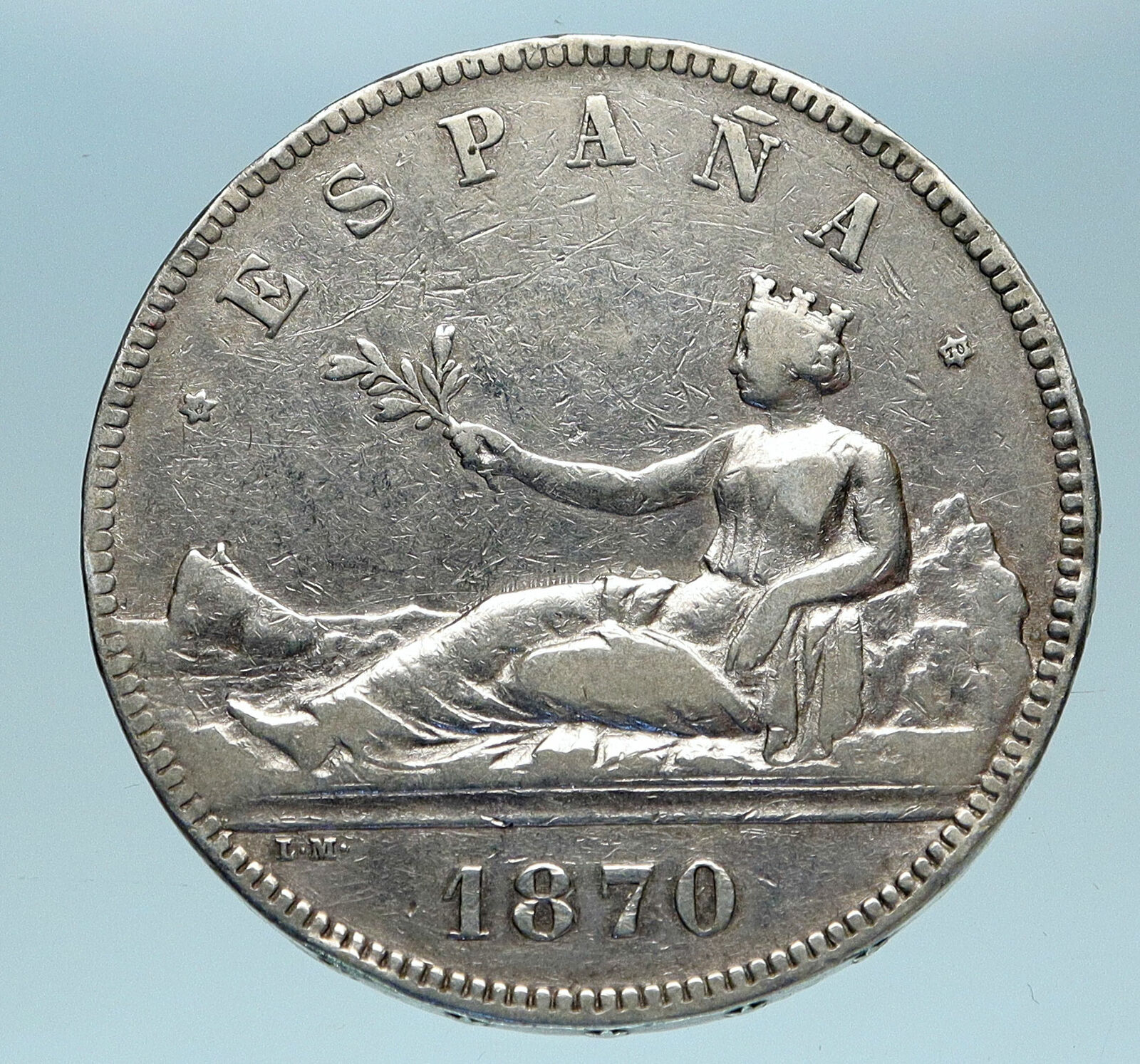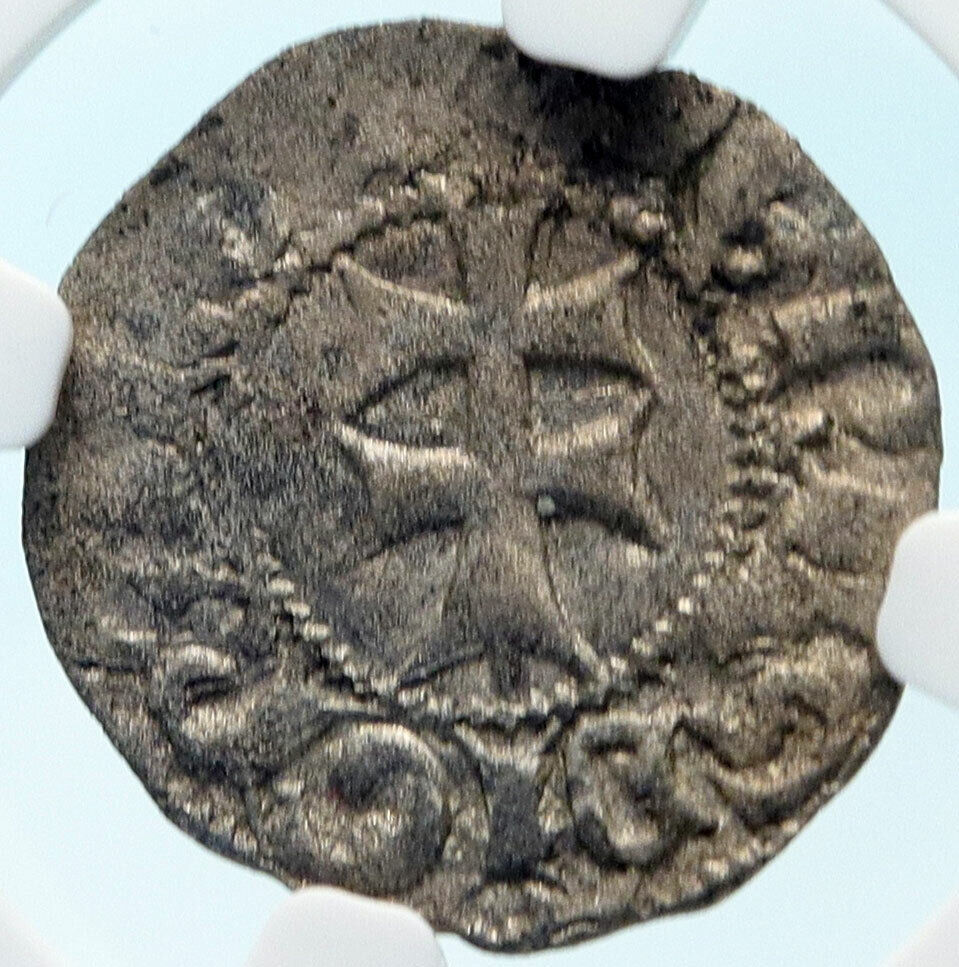|
Spain
under the Moors
1000-1200 AD Silver Coin
14mm (0.47 grams)
Inscription.
You are bidding on the exact item pictured, provided with a Certificate of Authenticity and Lifetime Guarantee of Authenticity.
 The term Moor is an exonym first used by Christian Europeans to designate the Muslim inhabitants of the Maghreb, the Iberian Peninsula, Sicily and Malta during the Middle Ages. The Moors initially were the indigenous Maghrebine Berbers. The name was later also applied to Arabs and Arabized Iberians. The term Moor is an exonym first used by Christian Europeans to designate the Muslim inhabitants of the Maghreb, the Iberian Peninsula, Sicily and Malta during the Middle Ages. The Moors initially were the indigenous Maghrebine Berbers. The name was later also applied to Arabs and Arabized Iberians.
Moors are not a distinct or self-defined people. The 1911 Encyclopædia Britannica observed that the term had “no real ethnological value.” Europeans of the Middle Ages and the early modern period variously applied the name to Arabs, North African Berbers, as well as Muslim Europeans.
The term has also been used in Europe in a broader, somewhat derogatory sense to refer to Muslims in general, especially those of Arab or Berber descent, whether living in Spain or North Africa. During the colonial era, the Portuguese introduced the names “Ceylon Moors” and “Indian Moors” in South Asia and Sri Lanka, and the Bengali Muslims were also called Moors. In the Philippines, the longstanding Muslim community, which predates the arrival of the Spanish, now self-identifies as the “Moro people”, an exonym introduced by Spanish colonizers due to their Muslim faith.
In 711, troops mostly formed by Moors from northern Africa led the Umayyad conquest of Hispania. The Iberian Peninsula then came to be known in Classical Arabic as al-Andalus, which at its peak included most of Septimania and modern-day Spain and Portugal. In 827, the Moors occupied Mazara on Sicily, developing it as a port. They eventually went on to consolidate the rest of the island. Differences in religion and culture led to a centuries-long conflict with the Christian kingdoms of Europe, which tried to reclaim control of Muslim areas; this conflict was referred to as the Reconquista. In 1224, the Muslims were expelled from Sicily to the settlement of Lucera, which was destroyed by European Christians in 1300. The fall of Granada in 1492 marked the end of Muslim rule in Spain, although a Muslim minority persisted until their expulsion in 1609.
 .svg/85px-Escudo_de_España_(mazonado).svg.png) Spain, officially the Kingdom of Spain (Spanish: Reino de España), is a country mostly located on the Iberian Peninsula in Europe, with there also being two large archipelagoes, the Balearic Islands in the Mediterranean Sea and the Canary Islands off the African Atlantic coast, two cities, Ceuta and Melilla, on the African mainland and several small islands in the Alboran Sea near the African coast. The country’s mainland is bordered to the south and east by the Mediterranean Sea except for a small land boundary with Gibraltar; to the north and northeast by France, Andorra, and the Bay of Biscay; and to the west and northwest by Portugal and the Atlantic Ocean. It is the only European country to have a border with an African country (Morocco) and its African territory accounts for nearly 5% of its population, mostly in the Canary Islands but also in Ceuta and Melilla. Spain, officially the Kingdom of Spain (Spanish: Reino de España), is a country mostly located on the Iberian Peninsula in Europe, with there also being two large archipelagoes, the Balearic Islands in the Mediterranean Sea and the Canary Islands off the African Atlantic coast, two cities, Ceuta and Melilla, on the African mainland and several small islands in the Alboran Sea near the African coast. The country’s mainland is bordered to the south and east by the Mediterranean Sea except for a small land boundary with Gibraltar; to the north and northeast by France, Andorra, and the Bay of Biscay; and to the west and northwest by Portugal and the Atlantic Ocean. It is the only European country to have a border with an African country (Morocco) and its African territory accounts for nearly 5% of its population, mostly in the Canary Islands but also in Ceuta and Melilla.
 With an area of 505,990 km2 (195,360 sq mi), Spain is the largest country in Southern Europe, the second largest country in Western Europe and the European Union, and the fourth largest country in the European continent. By population, Spain is the sixth largest in Europe and the fifth in the European Union. Spain’s capital and largest city is Madrid; other major urban areas include Barcelona, Valencia, Seville, Bilbao and Málaga. With an area of 505,990 km2 (195,360 sq mi), Spain is the largest country in Southern Europe, the second largest country in Western Europe and the European Union, and the fourth largest country in the European continent. By population, Spain is the sixth largest in Europe and the fifth in the European Union. Spain’s capital and largest city is Madrid; other major urban areas include Barcelona, Valencia, Seville, Bilbao and Málaga.
Modern humans first arrived in the Iberian Peninsula around 35,000 years ago. Iberian cultures along with ancient Phoenician, Greek and Carthaginian settlements developed on the peninsula until it came under Roman rule around 200 BCE, after which the region was named Hispania, based on the earlier Phoenician name Sp(a)n or Spania. At the end of the Western Roman Empire the Germanic tribal confederations in migration from Central Europe invaded the Iberian peninsula and established themselves in relatively independent realms in its western provinces, including the Sueves, Alans and Vandals. Eventually, the Visigoths would integrate by force all remaining independent territories in the peninsula, including Byzantine provinces into the Kingdom of Toledo that more or less unified politically, ecclesiastically and legally all the former Roman provinces or successor kingdoms of what was then known in documents as Hispania.
The Visigothic kingdom fell to the Moors except in the north where shortly after started a process known as Reconquista. Spain emerged as a unified country in the 15th century under the Catholic Monarchs, who completed the eight centuries-long Reconquista in 1492. In the early modern period, Spain became one of history’s first global empires, leaving a vast cultural and linguistic legacy that includes over 500 million Hispanophones, making Spanish the world’s second most spoken native language, after Mandarin Chinese.
Spain is a parliamentary democracy and constitutional monarchy, with King Felipe VI as head of state. It is a major developed country with the world’s fourteenth largest economy by nominal GDP and sixteenth largest by purchasing power parity. It is a member of the United Nations (UN), the European Union (EU), the Eurozone, the Council of Europe (CoE), the Organization of Ibero-American States (OEI), the Union for the Mediterranean, the North Atlantic Treaty Organization (NATO), the Organisation for Economic Co-operation and Development (OECD), OSCE, the Schengen Area, the World Trade Organization (WTO) and many other international organisations. Spain has a “permanent invitation” to the G20 summits that occur generally once a year.
|





 The term Moor is an exonym first used by Christian Europeans to designate the Muslim inhabitants of the Maghreb, the Iberian Peninsula, Sicily and Malta during the Middle Ages. The Moors initially were the indigenous Maghrebine Berbers. The name was later also applied to Arabs and Arabized Iberians.
The term Moor is an exonym first used by Christian Europeans to designate the Muslim inhabitants of the Maghreb, the Iberian Peninsula, Sicily and Malta during the Middle Ages. The Moors initially were the indigenous Maghrebine Berbers. The name was later also applied to Arabs and Arabized Iberians.
.svg/85px-Escudo_de_España_(mazonado).svg.png) Spain, officially the Kingdom of Spain (Spanish: Reino de España), is a country mostly located on the Iberian Peninsula in Europe, with there also being two large archipelagoes, the Balearic Islands in the Mediterranean Sea and the Canary Islands off the African Atlantic coast, two cities, Ceuta and Melilla, on the African mainland and several small islands in the Alboran Sea near the African coast. The country’s mainland is bordered to the south and east by the Mediterranean Sea except for a small land boundary with Gibraltar; to the north and northeast by France, Andorra, and the Bay of Biscay; and to the west and northwest by Portugal and the Atlantic Ocean. It is the only European country to have a border with an African country (Morocco) and its African territory accounts for nearly 5% of its population, mostly in the Canary Islands but also in Ceuta and Melilla.
Spain, officially the Kingdom of Spain (Spanish: Reino de España), is a country mostly located on the Iberian Peninsula in Europe, with there also being two large archipelagoes, the Balearic Islands in the Mediterranean Sea and the Canary Islands off the African Atlantic coast, two cities, Ceuta and Melilla, on the African mainland and several small islands in the Alboran Sea near the African coast. The country’s mainland is bordered to the south and east by the Mediterranean Sea except for a small land boundary with Gibraltar; to the north and northeast by France, Andorra, and the Bay of Biscay; and to the west and northwest by Portugal and the Atlantic Ocean. It is the only European country to have a border with an African country (Morocco) and its African territory accounts for nearly 5% of its population, mostly in the Canary Islands but also in Ceuta and Melilla. With an area of 505,990 km2 (195,360 sq mi), Spain is the largest country in Southern Europe, the second largest country in Western Europe and the European Union, and the fourth largest country in the European continent. By population, Spain is the sixth largest in Europe and the fifth in the European Union. Spain’s capital and largest city is Madrid; other major urban areas include Barcelona, Valencia, Seville, Bilbao and Málaga.
With an area of 505,990 km2 (195,360 sq mi), Spain is the largest country in Southern Europe, the second largest country in Western Europe and the European Union, and the fourth largest country in the European continent. By population, Spain is the sixth largest in Europe and the fifth in the European Union. Spain’s capital and largest city is Madrid; other major urban areas include Barcelona, Valencia, Seville, Bilbao and Málaga.




